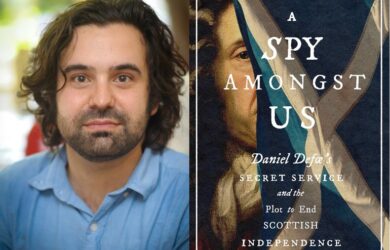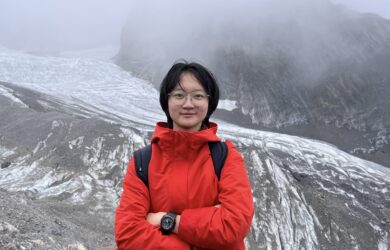
Michael Marin's research investigates why corporate governance broke down during the financial crisis.
Michael Marin is well aware his life could have taken a very different path. Brought up by a single mother who was working around the clock to pay the bills, he fell far behind in his reading by the age of 10. His teacher hadn’t noticed and initially thought he must have a learning difficulty. His mum had been so busy working day and night shifts as a medical technician that she had put all her faith into the school to educate him properly.
When she discovered the extent of Michael’s literacy problems, she got him a tutor who taught him to read in just a few lessons and applied for a place at private school for him. However, that was well beyond her means. Luckily, he was able to get a scholarship. It literally changed Michael’s life. “It was a real turning point for me,” he says. “There is no way I would be where I am now if it had not been for that opportunity. A lot of the children I grew up with never graduated from high school.”
He kept in touch with one boy who had a similar background to him. “Our circumstances could not have been more identical,” he says. “He was every bit as talented as me, but he did not have the opportunity I had. At that moment our lives went in completely opposite directions. He left high school, but never went to university. He never had the opportunity to develop his potential. It makes you see that it’s all about luck and circumstances and it shouldn’t be.”
His new school was very academically focused and he flourished there. “They expected success and excellence. It was the first time in my life I felt I had to achieve, that I could achieve and that the system would not give up on me,” he says.
Michael’s parents were both first generation immigrants to Montreal, Canada – his mother from Poland and his father from Spain. Both had a strong science background – his father was a professor of engineering – and encouraged him to take sciences at high school. “It was not really my passion,” says Michael. At high school he was more interested in social issues. He founded an annual conference called Destiny Quebec which was a response to the 1995 referendum on Quebec becoming a separate state. “It was a very traumatising experience and I thought that dialogue was important and that we should try to understand each other better,” he says. His school was in an anglophone community and had never had much opportunity to engage with the francophone community. The conference brought together high school students to talk about the future of Quebec.
Michael [2011] says his role in Destiny Quebec was part of a passion for society and politics which, when he was at university, resulted in him becoming involved in student movements and attempting to raise awareness about inequality of access to post-secondary education in Canada.
At the University of Ottawa, he studied law, including international public law and human rights. He also took part in an international law competition, won the Canadian championships and represented Canada in the final in the US.
He finished his masters in public policy at Carleton University while in law school. Both universities were in the same city, Ottawa, so there were no big practical problems. He finished law school in 2008 and had already been recruited by then to work for a commercial litigation firm in New York. “It was an eye-opening experience,” he says. “It reinforced and revived my passion for social and economic justice. I was working on Wall Street at the time of the financial crisis.”
He had been a summer associate at the firm in 2007 just as the crisis emerged. “What I found particularly disturbing was the sense that the financial system had become completely oblivious to the risks and damage it was doing to society. It was completely unaccountable and the people who were suffering the consequences were not the people on Wall Street, but the people I had grown up with. It was a huge injustice,” he says.
Michael adds that “we need to figure out a way to ensure the people who have political and economic power are accountable for it and give them an incentive to consider the public interest”. “They have to believe they stand to lose if the system is not reformed. Otherwise they will not change,” he says. “The days of corporate and financial impunity are numbered.”
He adds that new ways of managing the economy need to be developed. “It’s not just about convincing rich people they should care more. It’s not a personal thing. The system does not provide incentives for them to stop and think.”
His research at Cambridge where he is doing an LLM in Law is looking at ways to explain why the corporate governance system broke down in the financial crisis, to find out where the gaps are in the system which led to the breakdown and to explain how these gaps existed in several different countries at the same time even though they had different governance systems. His aim is to find out how to prevent future instability.
One area he is looking at is accountability. He says one of the problems that led to the current state of affairs is that many of the people on the boards of banks like Lehman Brothers did not fully understand the financial and social risks of the types of investment the bank was making. “We need to ensure they have the knowledge and sensibility to broad social interests as well as the mechanisms necessary to hold the bank to account,” he says. “The current system encourages banks to externalise risk. If directors’ money was on the line they might behave more responsibly. Human beings need incentives to act responsibly and it is not sufficient to hold corporate entities to account to prevent future instability. We also need to hold individuals to account.”
In addition to his research, Michael is also involved in several organisations aimed at tackling inequality. He is President of the CAPE scholarship programme which he founded in 2009 to help people from disadvantaged backgrounds pursue professional studies and encourages them to use the skills they gain to benefit communities like the ones they come from.
In 2011, he also became a Fellow of Action Canada, a public policy leadership programme, and is studying the impact of inequality on long-term economic prosperity.
Michael is keen to continue his research when he finishes his LLM next year. He says he wants to look next at a new corporate governance model to deal with issues around managing natural resources in a sustainable way and sharing them equitably with Canada’s aboriginals. The link with the financial crisis issue is, as always, fairness and social justice. “It’s about ensuring all stakeholders’ interests are represented in economic decision-making,” he says.












